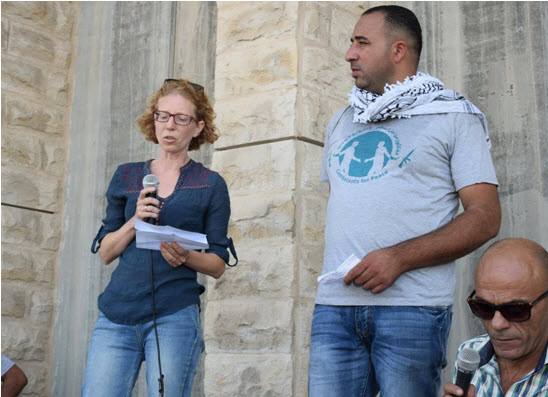Last month, the Public Committee against Torture in Israel (PCATI) registered a gain in a petition it presented to the Supreme Court two years ago. The petition was presented in the name of nine Palestinian men who were subjected to severe ill-treatment by soldiers. One of the complainants was arrested by soldiers one night in 2009, during the holy month of Ramadan, at a temporary checkpoint on the road to Bethlehem. Soldiers tied his hands behind his back with tight flexi cuffs, covered his eyes, and transferred him in the early hours of the morning to a detention center. His requests to be allowed to pray, go to the toilet, or receive food and water before the beginning of the fast was all turned down. He was beaten, kicked, and verbally attacked. In the cell in the detention center he was beaten by two soldiers and then attacked by prison guards, who smashed his head and body against the wall.

PCATI’s Director Rachel Stroumsa speaking at a Freedom March organized by Combatants for Peace and Standing Together; the event addressed the issue of administrative detentions and the rights of detainees. (Photo: PCATI)
Representing this man and eight other individuals, PCATI presented a complaint to the Military Attorney General. After waiting for years without receiving an answer, despite the severity of the allegations, PCATI appealed to the Supreme Court. The submitted petition demanded not just an answer and justice for these people, but also a comprehensive, systemic solution: “It is no less important that complaints alleging severe violence be examined within a reasonable time frame. It is unthinkable that a man tortured in 2009 will also undergo a torturous wait of seven years with no response to his complaint.
In the Supreme Court hearing held last January it became apparent that due to a “clerical error” complainants were never updated regarding their cases. Furthermore, it was revealed that this was not a restricted mistake, but that over 60 complainants whose files had been closed between 2014 and 2016 were never updated. In the wake of this revelation, the Military Attorney General established several new regulations designed to ensure that complaints are answered. In a second and final hearing held earlier this month, the court ruled that PCATI’s petition advances the recommendations of the Ciechanover and Turkel governmental committees, which state that complaints regarding soldier violence should be examined within a time period of no longer than 14 weeks. These recommendations were adopted by the security cabinet at the beginning of July. In addition, the Supreme Court ruled that the state must bear PCATI’s legal expenses, to the tune of 40,000 NIS.
According to PCATI Director Rachel Stroumsa, “We were pleased with the declaration of the Supreme Court. However, everyone on our staff knows that we have a lot of work ahead of us. Every year we receive dozens of complaints regarding soldier violence. PCATI alone gathered 151 complaints of violence amounting to torture between 2007 and 2013, and less than 2% of those ended in a conviction. Soldier violence towards Palestinians is a phenomenon requiring deep introspection within the army and a societal change in Israeli society; it is also part of a larger problem of violence by the different security forces, in flagrant breach of the Convention against Torture. We will continue to work to ensure that stories like those of our complainant will not remain the norm.”


